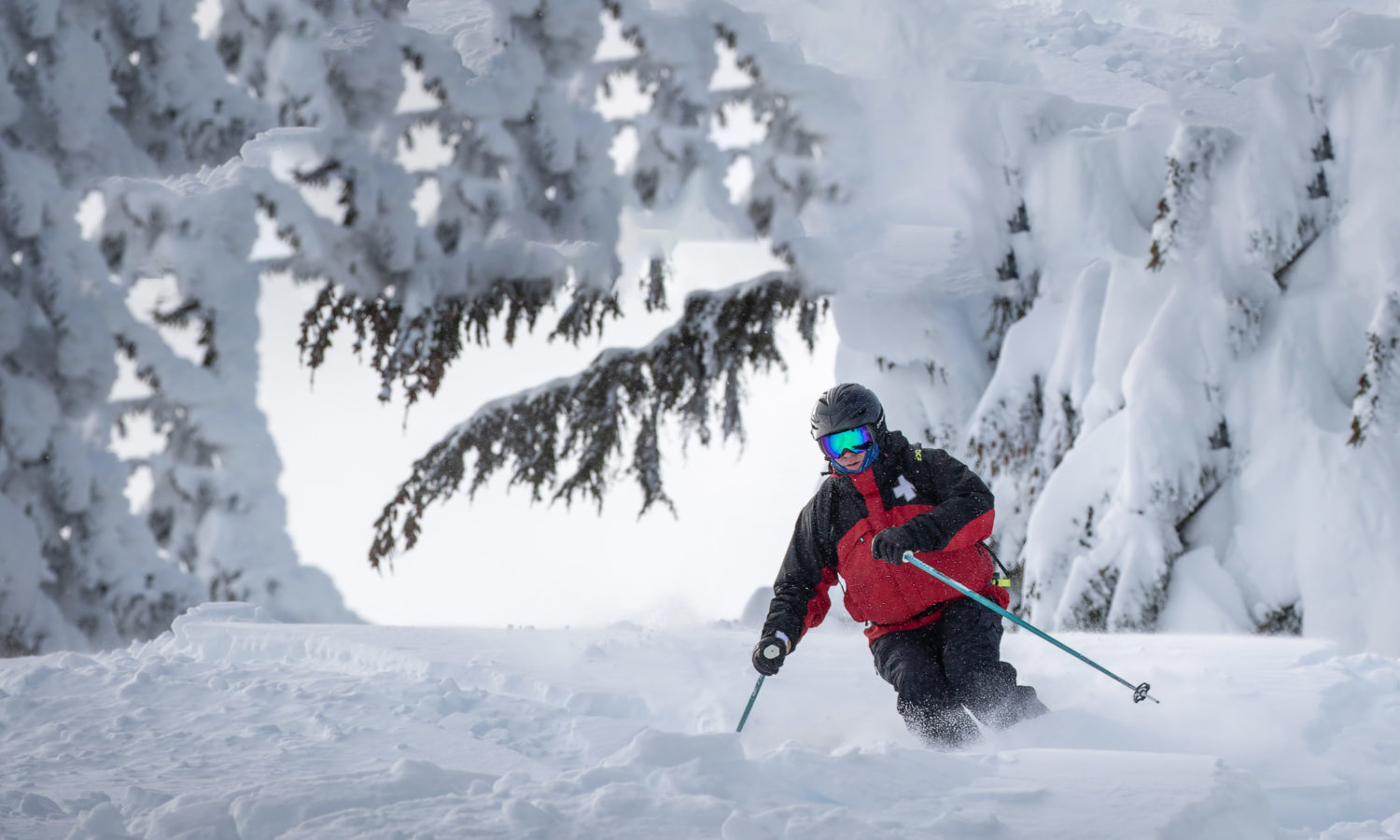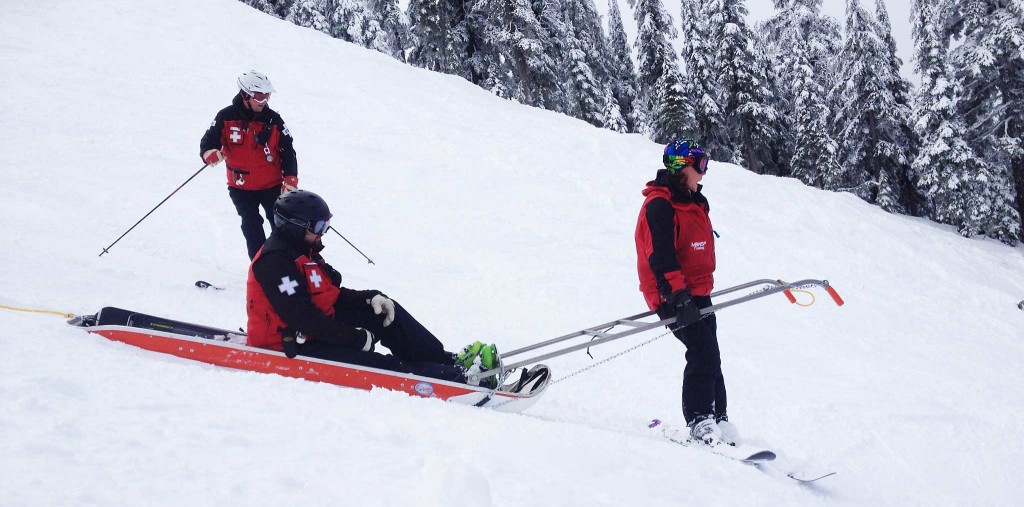The ski test will consist of two or more runs. On the first one we go through the basics: Carved, short-medium-long radius turns, strong snowplowing, sideslips/falling leaf, herringbones, etc. We will demonstrate each of these skills first so you know what we expect. For those interested in alpine patrol we will also ski moguls, then do some kick-turns to assess stability, and ski some off-piste terrain. These evaluations will take place pretty much independent of mountain conditions.
Yes and no. We offer a challenge class for those with other emergency care certifications, so they may not need to take the full OEC class. However experience has taught us that these certifications may not fully prepare students for the types of first aid skills they are likely to need on the mountain. Students with other certifications who have taken the OEC class have consistently commented that it was a good refresher and the hands-on aspect of the class was valuable. Please discuss this option with us if you desire to challenge the OEC requirement.
We require CPR for Health Care Professionals certification for every discipline. We teach CPR each year in Bend. Additionally, there are certifications of CPR for Health Care Professionals through other organizations locally. If you currently are certified through your workplace, a copy of your current card is required to document your status. To meet NSP requirements, you must recertify your CPR on an annual basis.
Annual OEC-recertification, which covers approximately one third of the OEC curriculum, is required of our membership, either by attending Mt. Bachelor’s Fall Refresher, or refreshers offered by other NSP Patrols. This training refreshes many of the patroller’s skills such as OEC, chairlift evacuation, mountain medical protocols, and snowmobile protocols. The OEC refresher occurs on Saturday, and the mountain operations refresher is on Sunday usually in early November.
This training follows the OEC classroom training and begins in November. You take your newly learned medical skills to Mt. Bachelor for outdoor training. This focuses on emergency medical scenarios in an outdoor environment. Prior to the mountain opening the training is held on “flat land”. Once the mountain is open the training is held on various ski runs. With successful completion of this training all candidates must pass a “hands-on” evaluation, blending medical skills with transportation skills and in many cases radio and patient handoff skills. Having passed this on-the-hill evaluation, Patroller Candidates advance to Probationary Status.
Prior to being voted on by the patrol to join our ranks all candidates must complete probationary patrolling. Candidates will patrol with various patrollers, both NSP and Pro Patrol, throughout the day. Candidates are required to “work” a given number of accidents and learn the mountain’s terrain, along with completing other probationary details. This is where other patrol members get a chance to know you, observe your skills and dedication to the patrol. Probation Status currently consists of a minimum of 8 working days.
You will be required to Patrol a minimum of 18 weekend days and attend a CPR and Fall Refresher each year as well as attending monthly patrol meetings. You will signup for patrol days each trimester, or two month period beginning in November. You are free to choose your weekends although specific choices are not initially guaranteed. If a conflict occurs during the season, you are required/expected to swap days with other patrollers to assure the mountain has appropriate patrol coverage. You are also encouraged to participate in the patrol in other ways: teaching classes, organizing training or fundraising activities etc.
During the training year, Alpine and Nordic candidates will receive a full season ski pass at Mt. Bachelor. In addition, at the completion of training, Alpine and Nordic patrollers become eligible to provide season passes for their spouse and children under the age of 18. Patrollers are also eligible for major discounts on ski and outdoor equipment with major brands through the National Ski Patrol commonly referred to as “pro deals”. This “pro deal” benefit is also extended to the candidate during the training year.
During the training year, Aid Room Candidates will receive a full season ski pass at Mt. Bachelor. In addition, at the completion of training, Aid Room Patrollers will become eligible to provide season passes for their spouse and children under the age of 18 at a 50% discount from published pricing. Patrollers are also eligible for major discounts on ski and outdoor equipment with major brands through the National Ski Patrol commonly referred to as “pro deals”. This “pro deal” benefit is also extended to the candidate during the training year.
Costs include:
- $150 Outdoor Emergency Care (OEC) course
- $100 OEC Textbook
- ~$155 for annual dues (Local, Regional, Division, and National)
- $150 – $600 for Uniform (jacket/vest/pack/etc.). These costs can vary based on personal preference. MBNSP will reimburse patrollers $200 every 5 years to offset the cost of uniforms.
* These costs are estimates and subject to change.
It is very important that candidates realize that training and qualification activities are a major time commitment. The training process will take approximately 13-15 months depending on modality. Training consists of:
- Ski evaluations for Alpine and Nordic Candidates are performed during January.
- Outdoor Emergency Transportation (OET) training for Alpine Candidates will begin the first weekend of February and conclude in early March.
- Outdoor Emergency Care (OEC) classes will begin with 3-4 classes in April. Candidates will be expected to complete the OEC textbook reading during the summer months. Classes will resume after Labor Day. Fall classes will be two evenings each week along with 3-4 Saturday on-hill sessions. Classes will continue through end of October and conclude with standardized written and practical exams.
- Flat ground training will commence at the conclusion of OEC training and take place over two Saturdays in early November.
- Probationary Patrolling will follow Flat Ground training and commence at the beginning of the ski season. During this time, candidates will be mentored by veteran patrollers within their modality during the ski season. Mentoring will take place on Weekends and can vary in duration by modality. The goal is to prepare the candidate to perform complete full patroller duties without assistance from the mentor.
- Upon successful completion of training, the Candidates Training Director will recommend candidates to be “voted on” by a vote of the general patrol. Generally, the voting process will take place by the end of the ski season.
The Candidate Training Director is your primary contact with the patrol. He/she will help guide you through the entire candidate process, notify you when training will be held, and answer all your questions. The CTD can be reached by emailing info@mtbachelornsp.org.
Skiing, snowboarding, and telemark are all options for patrol. We have skiers, snowboarders, and telemarkers currently on patrol!

